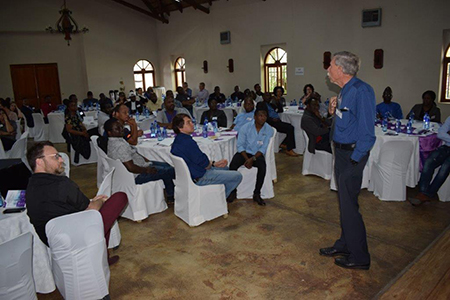The eight faculties of the North-West University (NWU) and their postdoctoral fellows, who hail from all over the world, came together on 20 September at Crista Galli in Potchefstroom to discuss different ideas on how to improve the postdoctoral fellowship programme at the NWU.
After Prof Dan Kgwadi, NWU vice-chancellor, had welcomed the group of postdoctoral fellows and hosts, he thanked them for their contribution in making the NWU one of the top five universities in the country.
Doret Kruger from the Technology Transfer and Innovation Support office offered an overview of the university’s postdoctoral fellowship programme. “This programme is designed to bring new and innovative research ideas to the university,” she said.
According to Doret, the NWU had 225 postdoctoral fellows in 2018 who contributed 7,3% to the research output of the university.
Each faculty was also awarded the opportunity to explain how postdoctoral fellowships work in their respective faculties, and to offer ideas on how to enhance the programme.
The same issues seemed to crop up in all the faculties: different funding models and a sense of isolation among postdoctoral fellows.
Prof Frans Waanders from the Faculty of Engineering noted that, when there is a lack of research funding, the Faculty of Engineering reaches out to the industry to try and secure funding. According to Prof Waanders, this approach has been quite successful.
Prof Petra Bester from the Faculty of Health Sciences explained that they put together a plan of action after a SWOT analysis had been done. This included a revision and development of a position statement for both postdoctoral fellows and their hosts, a stronger integration of postdoctoral fellows into the NWU, and a review of the payment system.
According to her, a monthly payment system with a type of proof of payment instead of the claiming process that is currently being used could increase the well-being of postdoctoral fellows.
Prof Thebe Medupe, who represented the largest faculty, the Faculty of Natural and Agricultural Sciences, and Dr Brews Soyapi, from the Law Faculty, agreed that postdoctoral fellowship packages needed to be benchmarked with those of other universities for the NWU to stay competitive in attracting the best postdoctoral fellows.
According to Prof Medupe, postdoctoral fellows are attracted to institutions with the best offerings, which also include top-class facilities and well-rated researchers.
“The Faculty of Natural and Agricultural Sciences has good laboratories and equipment, and we have 83 NRF-rated researchers, of whom about 15 are B-rated researchers,” he said.
Dr Isabella Bonati from the Faculty of Theology mentioned that postdoctoral fellows can also help to enhance the university’s international standing. “International postdoctoral fellows can expand the international network of the NWU and also do co-research with other international academics,” she said.
After hearing presentations from the various faculties, the group of postdoctoral fellows and hosts split into groups to further refine ideas on how to improve the postdoctoral fellowship programme at the university.
Prof Dan Kgwadi also listened intently to the presentations and will no doubt have been making notes on the various ways in which the programme can be improved.

Prof Frans Waanders from the Faculty of Engineering discusses ideas with the group of postdoctoral fellows and their hosts on how to improve the postdoctoral fellowship programme at the NWU.
